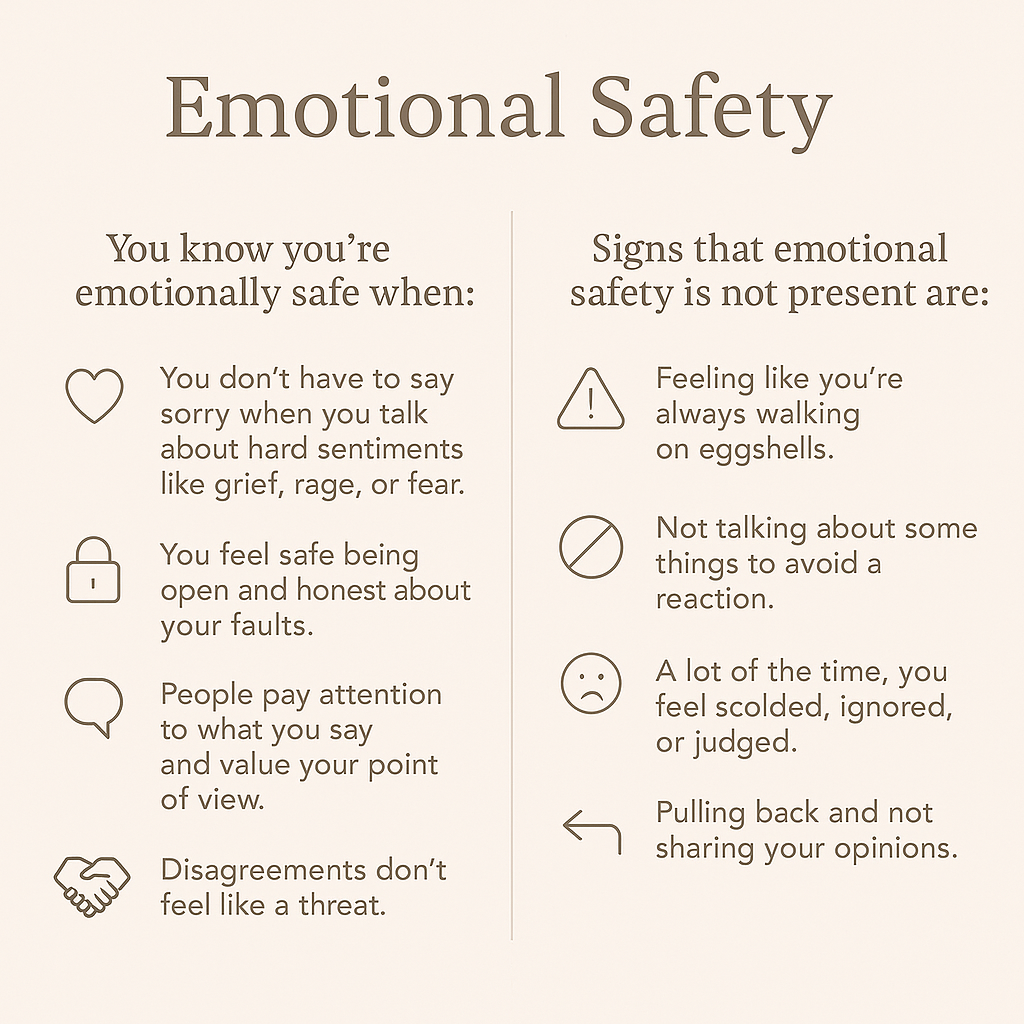What Is Emotional Safety & Why It Matters for Your Heart and Mind

Sarah Johnson, MD

Do you ever feel like you can't say what you really think because you're afraid of being criticized or shut down? You might not say what you think at a team meeting, hold back during an argument with your partner, or keep your problems to yourself because you don't want your friends to think you're "too much." This incessant editing of oneself is a sign of a bigger problem: a lack of emotional safety.
- What Is Emotional Safety? Definition & Core Elements
- Why Emotional Safety Matters
- How Emotional Safety Supports Psychological Well-Being
- Common Misconceptions & Limits
- How to Recognize Emotional Safety
- Practical Steps to Cultivate Emotional Safety in Relationships
- Cultivating Emotional Safety for Yourself
- When Emotional Safety Is Challenged
- FAQs
- Key Takeaways
This absence causes a lot of emotional agony. It makes you feel alone, like you're going through life on your own. It makes you anxious and makes you doubt everything you say. It makes you doubt not only other people but even your own judgment. You feel like you have to wear a mask and pretend to be someone you're not to fit in. It's tiring and bad for your health to always be on the lookout.
This article will help you locate and keep that important feeling of security. We will answer the question, "what is emotional safety?" and explore why it is so important for mental health and happy relationships. You'll discover how to tell if emotional safety is there or not in your life and get practical tips on how to grow it in your relationships with others and, most crucially, within yourself.

"If this constant self-editing sounds familiar, know that you can rebuild that sense of security. Exploring tools like a Mental Health AI can be a valuable first step in understanding your needs."
What Is Emotional Safety? Definition & Core Elements
What is emotional safety? Emotional safety means feeling welcomed, safe, and free to be yourself without worrying about what might happen. It's the foundation of trust and being open, which is crucial for overall mental health. Psychology Today says that psychological safety—a key component of mental health and wellbeing—is the feeling that you may be frank about your feelings without being made fun of, turned down, or punished. The main parts of it are:
- Unconditional Acceptance: Being valued for who you are, not only for what you do or say.
- Vulnerability: Being able to talk about your worries, dreams, and insecurities without being afraid.
- Feeling Heard and Understood: Knowing that your point of view is being heard and accepted, even if you don't agree with it.
- Trust: Being sure that the other person has your best interests at heart.
Why Emotional Safety Matters
Emotional safety isn't a luxury; it's a basic human need that has many benefits.
For your mental health, your nervous system can rest when you feel safe. This helps you manage your emotions better by lowering chronic stress and anxiety. You may deal with your feelings in a healthy way instead of letting fear take over.
For Relationships: Safety is what holds strong relationships together. It helps people get closer, trust each other more, and work through problems better. People that disagree talk to each other to understand one other, not to win.
For Self-Esteem and Authenticity: You can relax in a safe place. This lets you discover and accept who you really are, which helps you establish self-confidence from a place of acceptance instead of performance.
When you don't feel emotionally safe, on the other hand, you feel intimidated and protective. This is bad for your health because it hurts your mind, makes you feel disconnected, and keeps you on edge all the time. This environment makes it impossible to build trust, as you are constantly guarded against potential harm. If you often feel physically tense or anxious in relationships, it can help to understand how the vagus nerve helps you calm anxiety.
.
How Emotional Safety Supports Psychological Well-Being
The need for psychological safety goes beyond every part of life. Understanding what is emotional security helps us see its universal importance:
- Intimate Relationships: The most important aspect of a healthy partnership, true emotional safety lets couples be open and genuinely connected.
- Family Relationships: Creates a safe place for kids to grow up and allows for honest communication between parents and adult children.
- Friendships: This is the difference between shallow acquaintances and strong, supportive relationships where you can be yourself, a key sign of emotional safety.
- Workplace: Often called "psychological safety," it is fundamentally about emotional safety, letting teams innovate, admit mistakes, and collaborate without fear of blame.
- Self: Your relationship with yourself is the most important. Internal emotional security means being kind to yourself rather than being hard on yourself.
Common Misconceptions & Limits
It's crucial to make it clear what emotional safety isn't:
- It is not avoiding problems. A safe container for emotional safety can hold healthy conflict and make it useful.
It's not about being "soft." Genuine psychological safety takes bravery, strength, and clear limits.
- It doesn't mean that everyone will always be nice to you. It's about how breaks in trust are repaired, which is central to maintaining emotional safety.
- It is not a replacement for expert help. Therapy is necessary for individuals with severe trauma or mental illness to establish a foundation of emotional safety.
How to Recognize Emotional Safety

Practical Steps to Cultivate Emotional Safety in Relationships
Building emotional safety is something you have to think about and practice consciously. To truly understand what is emotional security in action, here are some important steps, especially for those who don't feel it naturally. It's crucial to recognize the signs when you don't feel safe and to have strategies to address it:
- Listen carefully and without judging: Don't just wait for your moment to talk; try to comprehend. Validating the other person's feelings ("It makes sense that you feel that way") is a cornerstone of emotional security and trust.
- Accept Emotions: Let people feel what they're feeling, even if it makes you uncomfortable. Don't try to "fix" things right away. This acceptance is vital for maintaining a safe emotional space in any relationship.
- Set and Respect Boundaries: Make sure everyone knows what your limits are and respect the limits that others set. This mutual respect builds a framework for emotional safety.
- Show how vulnerable you are: Be a role model. When you talk about your own concerns and problems, you encourage others to do the same, strengthening the sense of safety and mutual openness.
- Apologize and Repair: When you mess up (and you will), say you're sorry. Fixing breaks in trust is more essential than perfection for maintaining emotional safety.
- Be dependable and consistent: Keep your word. Over time, being consistent creates the trust that defines emotional safety.
Cultivating Emotional Safety for Yourself
Your mind is your first home. To keep it safe, you must cultivate internal emotional safety. Understanding what is psychological safety within yourself is the first step:
- Be kind to yourself and accept who you are: Talk to yourself like you would a close friend. Recognize your weaknesses without being too hard on yourself. This self-acceptance builds inner emotional security and self-trust.
- Recognize and Name Your Feelings: Just saying "I feel anxious" can make the feeling less strong and create internal space, a key practice for emotional safety.
- Change the way you talk to yourself: Question your negative self-talk. Instead of saying "I'm such a failure," say "I made a mistake, and I can learn from it." This reframes your inner dialogue to support emotional safety.
- Make a Safe Place for Yourself: Set aside time for yourself and things that make you feel good. Choose to spend time with people who make you feel secure, actively building your emotional safety.
- Know What Sets You Off: Figure out what situations or comments make you respond strongly. This self-awareness is the first step toward healing old wounds and strengthening your core emotional safety.
When Emotional Safety Is Challenged
Conflict, miscommunication, power imbalances, or trauma from the past will put safety to the test. When this happens, the way back is via purposeful repair: talking openly about your thoughts and feelings, being willing to see things from the other person's point of view, and, if necessary, getting help from a therapist to deal with deep-seated problems that affect your thoughts and feelings.
Emotional safety is a key part of living a good life. It is not a goal but a continuous practice. If you're wondering what is psychological safety in daily life, it starts with small, brave steps: say one truthful thing, ask for what you need, or choose to spend more time with people who earn your trust and make you focus on feeling safe. Keep in mind that growth takes time. Consistent, compassionate actions build psychological safety one brick at a time. Today, simply notice: Where in your life do you feel truly safe? Where is psychological safety lacking? Your awareness is the first and most powerful step toward creating more of the safety you deserve, a fundamental state of feeling safe and secure.
Conflict, miscommunication, power imbalances, or past trauma can all put safety to the test. If emotional manipulation is part of the issue, understanding how to deal with gaslighting can help you recognize patterns that undermine trust and rebuild healthy boundaries.
FAQs
What does emotional safety feel like?
It feels like a constant, warm calm. It's like peeling off a heavy mask. You may be your whole, flawed self without always being afraid.
How long does it take to build emotional safety?
It's a long process, not a quick remedy. It grows slowly through behavior that is steady and reliable. It can take weeks, months, or even years, especially if trust has been violated in the past.
Can you feel emotionally safe alone / by yourself?
Yes, of course. The basis for feeling safe with other people is feeling safe and caring for yourself. It is the most essential safety you can build.
Is emotional safety the same as psychological safety?
They are really similar. "Psychological safety" is a term that is widely used in teams and workplaces to mean feeling safe enough to take risks with other people, such speaking up. "Emotional safety" is a larger term that is often used in intimate relationships to mean the whole range of emotional vulnerability and connection.
What if someone I trust has hurt me—can emotional safety be rebuilt?
Yes, but the person who wounded you must really feel bad about it, apologize sincerely, and show that they have changed their conduct over time. The procedure is slow and needs both persons to be patient and dedicated.
Key Takeaways
- Emotional safety is the foundation for feeling accepted, able to be vulnerable, and trusted in relationships and with yourself.
- It is crucial for mental health, deep relationships, and living authentically.
- Learn to recognize the signs of safety (openness) and its absence (walking on eggshells).
- Actively build it by practicing deep listening, setting boundaries, and offering self-compassion.
- This is a journey of a thousand small steps—each act of courage and consistency matters.














